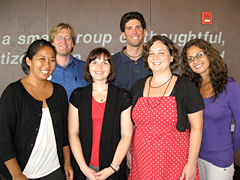Practical Idealism
On March 1, 1961, President Kennedy established the Peace Corps by executive order, initiating a program that has sent over 200,000 volunteers to promote global peace through service in 139 countries. The Shriver Peaceworker Program has been a natural extension of the Peace Corps since 1985, when the Shriver family created it to forge a pathway for Returned Peace Corps Volunteers (RCPVs) to become public service leaders.
The Shrivers later expanded and refined the Peaceworker Program, making it an integral part of the UMBC Shriver Center, where RCPVs now pursue graduate study while continuing their service work locally. More than 125 RCPVs have received advanced degrees through the UMBC program and over the last five years although just 15% of UMBC Peaceworkers have come from Maryland, 90% have chosen to stay and serve the Baltimore-DC region after completing the program.
The Peaceworker Program supports the Shriver Center’s mission to “address the need for remedies to the problems of our central cities,” extending beyond the primarily international mandate of the Peace Corps to tackle the challenges urban America is facing today. After all, reflected professor emeritus and former Peace Corps Member Ed Orser at a recent Peaceworker event, “Baltimore is a hard city to love, but at the same time, it’s a city that’s in so much need of love and so much need of understanding.”
No one understood this challenge better than Sargent Shriver, who served as first director of the Peace Corps and helped craft the Shriver Center’s mission statement. UMBC joined the Shriver family and the nation in mourning Shriver’s passing last month. Today, the campus community is committed to carrying on Eunice Kennedy Shriver and Sargent Shriver’s extraordinary legacy of public service.
At UMBC, the Peaceworker Program seeks “to educate and train a new generation of citizen leaders who are able to critically, creatively and responsibly address…complex economic, social and cultural problems.” Program alumnus and Practical Idealist Award recipient Richard Kimball ’10, Ph.D., health policy, used his period of service to redesign the Baltimore Homeless Census. Now affiliated with Johns Hopkins, he focuses on caregiving for people with long-term degenerative diseases.
UMBC Peaceworkers combine graduate study, intensive community service with Greater Baltimore community partners and ethical reflection to “intellectually and personally…integrate the practical, theoretical and moral dimensions of their experience.” Sally Scott (Association of Baltimore Area Grantmakers) recognizes, “It’s very hard just on your own to go show up on some city street and say, ‘Hey, I’m here to help.’” The goal is that alumni, like Kimball, develop the knowledge, skills and community connections to identify and implement solutions to deep-rooted social problems.
Even at this time of fiscal challenges, there is broad recognition that service has the potential to profoundly impact society. President Obama signed into law the largest Peace Corps appropriation to-date for FY 2010: $400 million.
UMBC will celebrate the Peace Corps turning 50 – a tremendous milestone in service history – at “Bringing the World Home: Stories from 50 Years of the Peace Corps” on March 1 at Baltimore’s Creative Alliance. For more information on service opportunities and the Peaceworker Program, see the Shriver Center website or contact program Director Joby Taylor or Deputy Director Jennifer Arndt Robinson.
(2/25/11)

